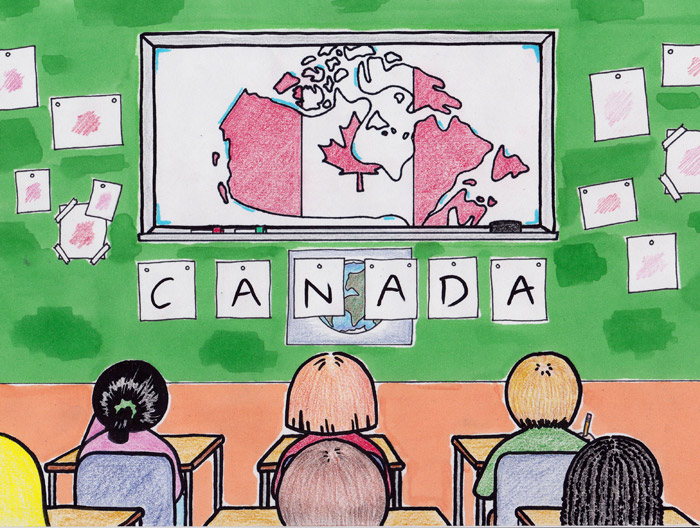Being Canadian has never been so confusing. According to Prime Minister Justin Trudeau, Canada has transcended the nation-state paradigm to become the first ‘post-national’ state, where ‘openness,’ ‘respect,’ ‘compassion,’ and ‘willingness to work hard’ are the country’s only distinguishing values. Trudeau’s presumable aim is to counteract bigotry and divisiveness by ushering in a new era of universality. It seems intuitively difficult, however, to build a sense of purpose among Canadians on such loose terms. The attack on Syrian refugees in Vancouver demonstrates how far these principles are from being shared, despite Trudeau’s multinational vision. Simply trumpeting openness, evidently, does little to actually instill it.
If Trudeau’s ideals are to mean anything to Canadians, they need to be framed within Canada’s own national story, so that Canadians feel connected to an identifiable, tried-and-true value system. A real answer to bigotry, then, does not lie in dissolving Canada’s national identity, but rather in reinvigorating and diversifying how Canadian history is understood and taught.
Of course, advocating for a reinvigorated national identity might stir some Canadian stomachs, conjuring images of flag-waving jingoism, or, worse still, Donald Trump’s “Freedom Girls.” Canada’s fear of this sort of behaviour has propelled it in the opposite direction. Now, instead of excessive pride, Canada should be wary something equally troubling; no unifying national identity whatsoever. This is a concern because national identity generates stability and cohesion. In Canada’s case, a simply post-national identity would contribute to the watering down of national values until they disappear entirely. A celebration of our diverse history would include the stories of the Aboriginal, French, and English peoples. Ideally, this history would instil greater tolerance while anchoring a common and tangible political, social, and value system.
Trudeau is right to say that we are an extremely diverse country. But contrary to Trudeau’s idea of a post-national state, Canada is still in fact a nation, with a population shaped by a common history. Moreover, Canada’s nationhood should never be viewed as an obstacle to overcome for the sake of total equality. Instead, Canada’s long tradition of balancing diverse and competing interests—whether inherent in the country or brought on by immigration—should be emphasized more in order to foster a generation of more tolerant and aware Canadians.
Essentially, the theme of Canada’s founding—a union of diverse backgrounds—should appear more often when recounting Canada’s history, especially as this theme is very relevant today. Such a revamped version would highlight minority groups who are often overlooked in Canadian history. It may pay attention to, for instance, the Coloured Hockey League in Nova Scotia, or the Syrian newcomers of the early 20th century who settled, among other places, in the Canadian Arctic. A crucial part of this would also involve recounting the instances in which Canadian decision-makers, and the country as a whole, failed to live up to its supposed values of openness and compassion. For examples, consider Canada’s treatment of Jewish refugees in 1939, Japanese internment in the 1940s, and Komogata Maru.
Of course, restructuring the national history lesson is easier said than done. First, it is a simple historical fact that adequately representing every group and sub-group of Canadian society is an impossible task. Certain groups are bound to be misrepresented, or left out entirely. Second, every province constitutionally retains its right to teach their own version of Canadian history, and the federal government can at best exercise soft power in this domain. Lastly, Canadian history, in virtually every province, remains a low priority.
Canadians require principles that are more explicitly a part of, and integrated in, their national story. ‘Openness,’ for example, is better understood by actually learning about Canada’s history of immigration, or the policy of multiculturalism in 1971. Likewise, ‘willingness to work hard’ is better ingrained by showcasing a day in the life of a 20th century Italian-Canadian factory worker, or the indentured labour of Chinese labourers on the Canadian Pacific Railway. Diversity forms a crucial part of, and should remain under, Canada’s national history. Trudeau’s values are worth pursuing, but they do not belong in his post-national vacuum. If the federal government does not reconsider the merits of a national identity, Canada will lose its sense of self.











So Justin says Canada is a post-national country.
What does that mean? He mentions shared values — the Kumbaya feel-good “shared values” of openness, compassion, respect, and hard work. Respect isn’t exactly a unique character of Canada — nor is compassion.
Japan is a very respectful nation, and they have very little immigration.
The other two values left — openness, as in open-borders flood the country with immigrants and refugees and TFW’s kind of openness? And then “work hard”? You mean, put ourselves into debt and allow corporations to profit off of us? Max out credit cards and loans and make a banker happy? And live the rest of your life paying the debts off? That kind of “hard work”?
Our shared Canadian values are to make money? Greed?
Should we even call it a “post-national” country? Maybe “country” infers too much? Maybe we should just call ourselves a generic faceless market? No borders. Strangers. Customers.
Just be a good “citizen” or “member of the fitness club” and make as much money as you can off other people.
There you go — Canada’s new shared value.
Since were essentially just a market, and “post-country”, why even have a government? We can be like Somalia? Maybe they are also “post-national”?
Similar in words to alot of Americans, Justin is #notmyprimeminister.
words matter and if we have been declared a post national state, to me that is a declaration that canada no longer exists, there for there is no national government no national law and no national currency. we are living in a state of suspended animation.